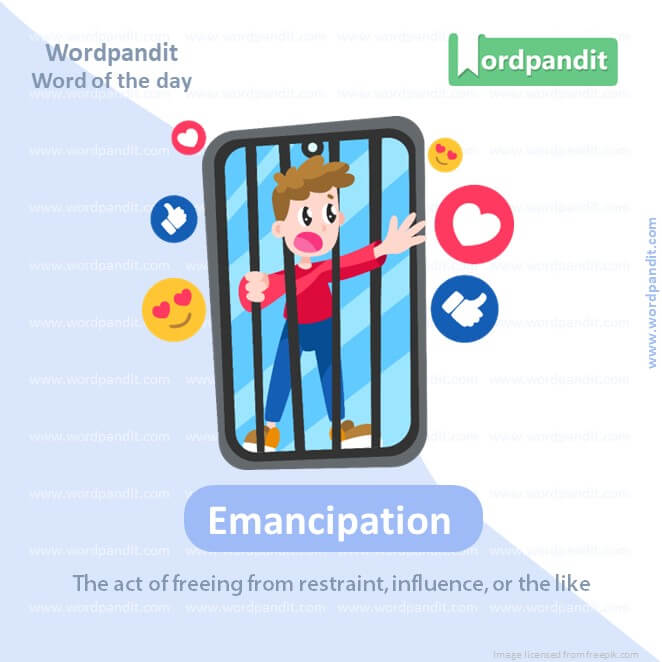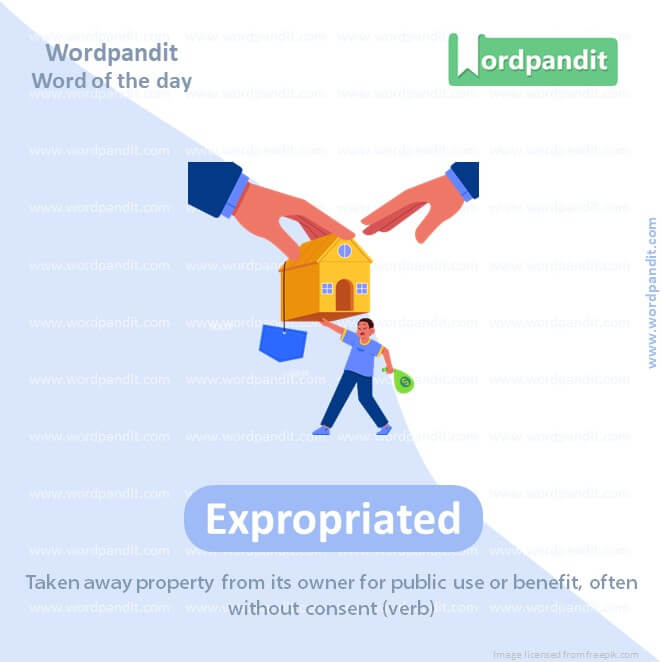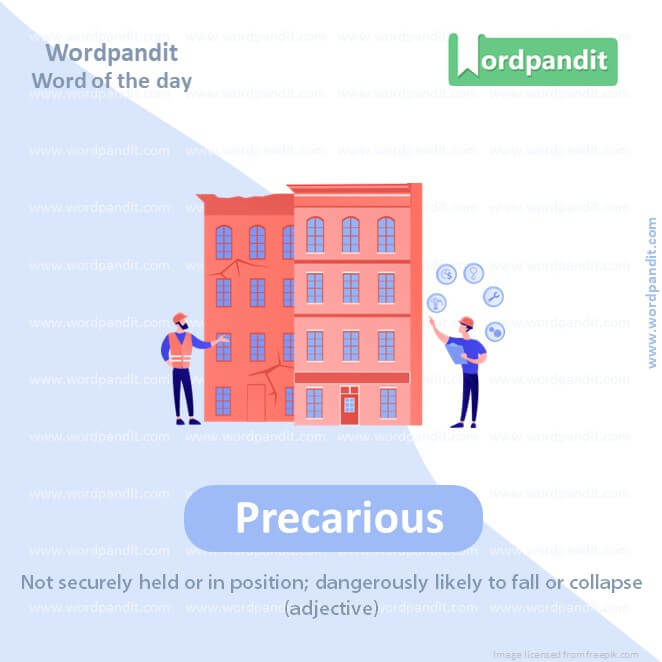Daily Vocabulary Words: List of Daily Used Words in Leading International Newspapers
Hi there. Welcome to this special section @ Wordpandit.
Our endeavour here is very simple: to highlight important daily vocabulary words, which you would come across in leading newspapers in the country. We have included the following newspapers in our selection:
• The New York Times
• The Washington Post
• Scientific American
• BBC
• The Guardian
• Psychology Today
• Wall Street Journal
• The Economist
We are putting in extensive work for developing your vocabulary. All you have got to do is be regular with this section and check out this post on a daily basis. This is your repository of words that are commonly used and essentially, we are posting a list of daily used words. Hence, this has significant practical application as it teaches you words that are used commonly in leading publications mentioned above.
Visit the website daily to learn words from leading international newspapers.

WORD-1: Emancipation
CONTEXT: More widespread education, women’s emancipation and population ageing have led to labour shortages.
SOURCE: Guardian
EXPLANATORY PARAGRAPH: Emancipation is like when a young bird learns to fly and finally leaves its nest to be on its own. It means gaining freedom from control or restraint.
MEANING: The act of freeing from restraint, influence, or the like.
PRONUNCIATION: ee-man-sih-PAY-shun
SYNONYMS: liberation, freedom, release, deliverance, liberty
USAGE EXAMPLES:
1. The emancipation of the slaves was a significant historical event.
2. She fought for the emancipation of oppressed groups.
3. Emancipation from restrictive traditions allowed for progress.
4. Legal emancipation can occur when a minor is granted adult rights.

WORD-2: Enthusiasm
CONTEXT: As you can imagine, that idea has been met with great enthusiasm on the Republican side.
SOURCE: Washington post
EXPLANATORY PARAGRAPH: Enthusiasm is like the excitement you feel when your birthday is coming up. It means feeling very happy and eager about something.
MEANING: Great excitement and interest in something (noun)
PRONUNCIATION: en-THOO-zee-az-um
SYNONYMS: eagerness, excitement, zeal, passion, ardor
USAGE EXAMPLES:
1. His enthusiasm for the project was contagious.
2. She showed great enthusiasm at the possibility of joining the team.
3. The crowd’s enthusiasm energized the performers.
4. He approached his new role with enthusiasm and dedication.

WORD-3: Foreordained
CONTEXT: There was nothing inevitable or foreordained about them.
SOURCE: New york times
EXPLANATORY PARAGRAPH: Foreordained is like a story that has an ending already written before you start reading. It means something is decided or determined ahead of time.
MEANING: Predetermined or decided in advance; predestined (adjective).
PRONUNCIATION: for-or-DAYND
SYNONYMS: predestined, destined, fated, predetermined, preordained
USAGE EXAMPLES:
1. It seemed foreordained that they would meet again.
2. His career path felt almost foreordained due to his family’s history.
3. The success of the project appeared foreordained by earlier achievements.
4. She believed their meeting was foreordained.

WORD-4: Expropriated
CONTEXT: Europe is arguing with itself, and its divisions on this issue only help Russia, which has already expropriated European companies,” a senior GOP congressional aide told me.
SOURCE: Washington post
EXPLANATORY PARAGRAPH: Expropriated is like when someone takes your toy without asking because they say they need it more than you. It means property is taken away from its owner, usually for public use.
MEANING: Taken away property from its owner for public use or benefit, often
without consent (verb).
PRONUNCIATION: eks-PRO-pree-ay-ted
SYNONYMS: confiscated, seized, requisitioned, appropriated, taken over
USAGE EXAMPLES:
1. The government expropriated land to build the new highway.
2. Farmers’ lands were expropriated for the dam project.
3. He was compensated after his property was expropriated.
4. Expropriated assets were used for national development.

WORD-5: Precarious
CONTEXT: the growth of precarious jobs that local workers won’t take.
SOURCE: Guardian
EXPLANATORY PARAGRAPH: Precarious is like when you balance a book on your head, and it could fall off any second. It means something is not secure and could quickly become dangerous or difficult.
MEANING: Not securely held or in position; dangerously likely to fall or collapse
(adjective).
PRONUNCIATION: preh-KAIR-ee-us
SYNONYMS: unstable, risky, insecure, uncertain, dangerous
USAGE EXAMPLES:
1. He made a precarious living as a freelance artist.
2. The ladder was in a precarious position.
3. Their financial situation was precarious.
4. It’s a precarious path to walk at night.
WORD-6: Retaliation
CONTEXT: Like a pro-Israel hacker group claiming credit for shutting down some 70 percent of Iran’s gas stations the other day, presumably in retaliation for Iran’s support for Hamas. And so many more.
SOURCE: New york times
EXPLANATORY PARAGRAPH: Retaliation is like when someone takes your toy, and then you take one of theirs to get back at them. It means doing something bad to someone because they did something bad to you first.
MEANING: The action of returning a military attack; counter-attack (noun).
PRONUNCIATION: re-tal-ee-AY-shun
SYNONYMS: revenge, reprisal, retribution, counterattack, vengeance
USAGE EXAMPLES:
1. He was accused of retaliation against his critics.
2. Retaliation for the attack was swift.
3. The company faced a lawsuit for illegal retaliation against a whistleblower.
4. She warned against the cycle of retaliation that would follow.
WORD-7: Showmanship
CONTEXT: They choose instead to talk tough and revert to acts of political showmanship that create an appearance of control, but that in effect function as a smokescreen to conceal the true nature of immigration policy.
SOURCE: Guardian
EXPLANATORY PARAGRAPH: Showmanship is like when someone not only tells a great story but also uses their voice and gestures to make it really exciting. It means having the skill to perform in an entertaining way that captures people’s attention.
MEANING: The skill of performing in such a way as to captivate or impress an audience (noun).
PRONUNCIATION: SHOW-man-ship
SYNONYMS: flair, style, panache, charisma, theatricality
USAGE EXAMPLES:
1. His showmanship during the presentation won over the audience.
2. She has a natural showmanship that makes her a fantastic performer.
3. The event lacked the showmanship we expected.
4. He used his showmanship to enhance the mundane report.
WORD-8: Fudging
CONTEXT: Johnson was fudging reality. The $300 billion of Russian assets frozen in U.S. and European banks would not be given to Ukraine right away.
SOURCE: Washington post
EXPLANATORY PARAGRAPH: Fudging is like when you change a few details in your story about how your room got messy to avoid getting into trouble. It means changing details or facts slightly to deceive or manipulate.
MEANING: Present or deal with (something) in a vague or inadequate way, especially so as to conceal the truth or mislead (verb).
PRONUNCIATION: FUHJ-ing
SYNONYMS: evading, altering, fabricating, misrepresenting, dodging
USAGE EXAMPLES:
1. He was caught fudging the financial numbers.
2. She fudged on her resume about her work experience.
3. They were fudging the truth to avoid criticism.
4. The report was accused of fudging important details.
WORD-9: Excruciating
CONTEXT: Gorbachev, Deng, Anwar el-Sadat, Menachem Begin, George H.W. Bush and Volodymyr Zelensky, to name but a few, faced excruciating choices, but they chose forks in the road that led to a safer and more prosperous world, at least for a time. Others, alas, have done the opposite.
SOURCE: New york times
EXPLANATORY PARAGRAPH: Excruciating is like when you scrape your knee, and it hurts a lot. It means feeling extremely painful.
MEANING: Intensely painful (adjective).
PRONUNCIATION: eks-KROO-shee-ay-ting
SYNONYMS: agonizing, torturous, severe, intense, unbearable
USAGE EXAMPLES:
1. She described the pain as excruciating.
2. The wait for news was excruciating.
3. He suffered from excruciating headaches.
4. The film’s suspense was excruciating.
WORD-10: Laughably
CONTEXT: Politicians have turned a blind eye as proven by almost laughably low levels of workplace enforcement.
SOURCE: Guardian
EXPLANATORY PARAGRAPH: Laughably is like when something is so silly or easy that you just have to giggle, like a baby trying to say a big word. It means ridiculously or obviously amusing.
MEANING: So as to arouse or deserve laughter (adverb).
PRONUNCIATION: LAFF-uh-blee
SYNONYMS: ridiculously, absurdly, comically, hilariously, amusingly
USAGE EXAMPLES:
1. The mistake was laughably simple to fix.
2. His excuse was laughably weak.
3. The disguise was laughably ineffective.
4. Their plan was laughably naive.
Vocabulary Spelling
In the rich tapestry of language learning, getting the ‘vocabulary spelling’ right forms a significant thread. These spelled words or the arrangement of letters give each word its unique identity. However, understanding ‘vocabulary spelling’ proficiently needs an insightful and strategic approach.
Starting the journey of learning ‘vocabulary spelling’, one must focus on observing patterns. English language words often follow certain spelling rules or patterns. Recognizing these can simplify the learning process, offering a systematic way to appreciate ‘vocabulary spelling’.
The trick to ingraining ‘vocabulary spelling’ effectively lies in the power of repetition. Regularly writing words can help reinforce the spelling in your memory. To boost this, tools like spelling quizzes or flashcards with the word on one side and the spelling on the other can provide an engaging way to practice ‘vocabulary spelling’.
An unconventional yet powerful approach to remember ‘vocabulary spelling’ is by using mnemonic devices. For instance, connecting the word’s spelling with a catchy phrase or rhyming pattern can make recall easier.
Integrating technology with learning ‘vocabulary spelling’ has its unique benefits, too. Apps offer various exercises and tests that not only enhance memory but also make learning fun.
Importantly, the learning of ‘vocabulary spelling’ should be punctuated with regular revisions. This ensures the recalled spelling is correct and cements it in your long-term memory.
In a nutshell, mastering ‘vocabulary spelling’ requires keen observation, regular practice, innovative mnemonic tools, use of technology, and timely revisions. As you follow this comprehensive path, you strengthen your grasp over ‘vocabulary spelling’, paving the way to language proficiency. Remember, every word spelled correctly is a moment of triumph in the enthralling escapade of language learning!













